Organisational Behaviour Report: Motivation, Culture, and Teams
VerifiedAdded on 2023/01/03
|17
|5390
|45
Report
AI Summary
This report provides an in-depth analysis of organisational behaviour, examining the influence of company culture, politics, and power dynamics on individual and team behaviour. It explores various models, including Handy's culture model and French and Raven's power model, to illustrate these impacts. The report also investigates the significance of employee motivation, focusing on content and process theories, such as Maslow's hierarchy of needs and Theory X and Theory Y, to demonstrate their role in achieving company goals. Furthermore, it differentiates between effective and ineffective teams, and discusses the application of organisational behaviour concepts within a corporate context, specifically referencing Shell plc to provide real-world examples. The report aims to provide a comprehensive understanding of how these elements interact to shape employee performance and organisational success.
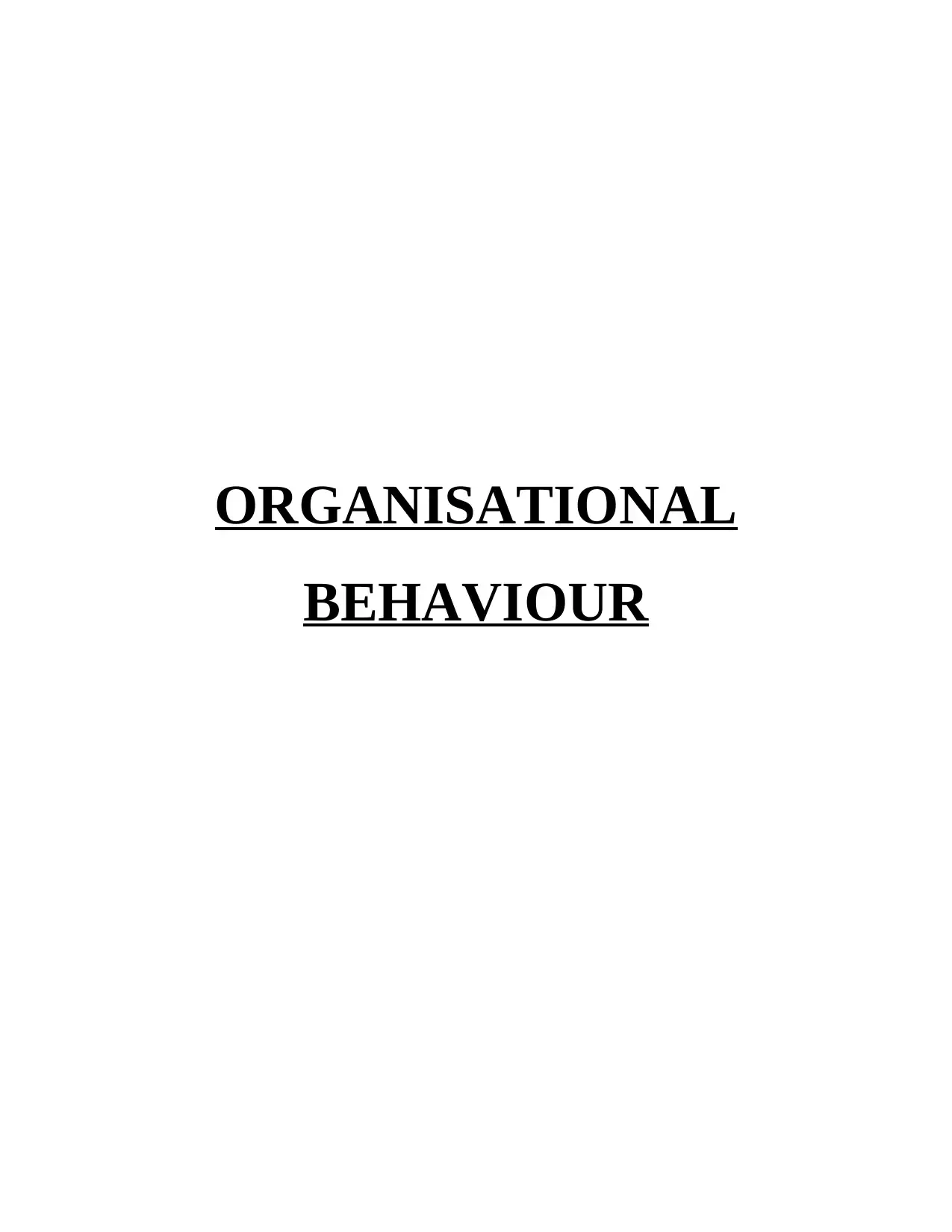
ORGANISATIONAL
BEHAVIOUR
BEHAVIOUR
Paraphrase This Document
Need a fresh take? Get an instant paraphrase of this document with our AI Paraphraser
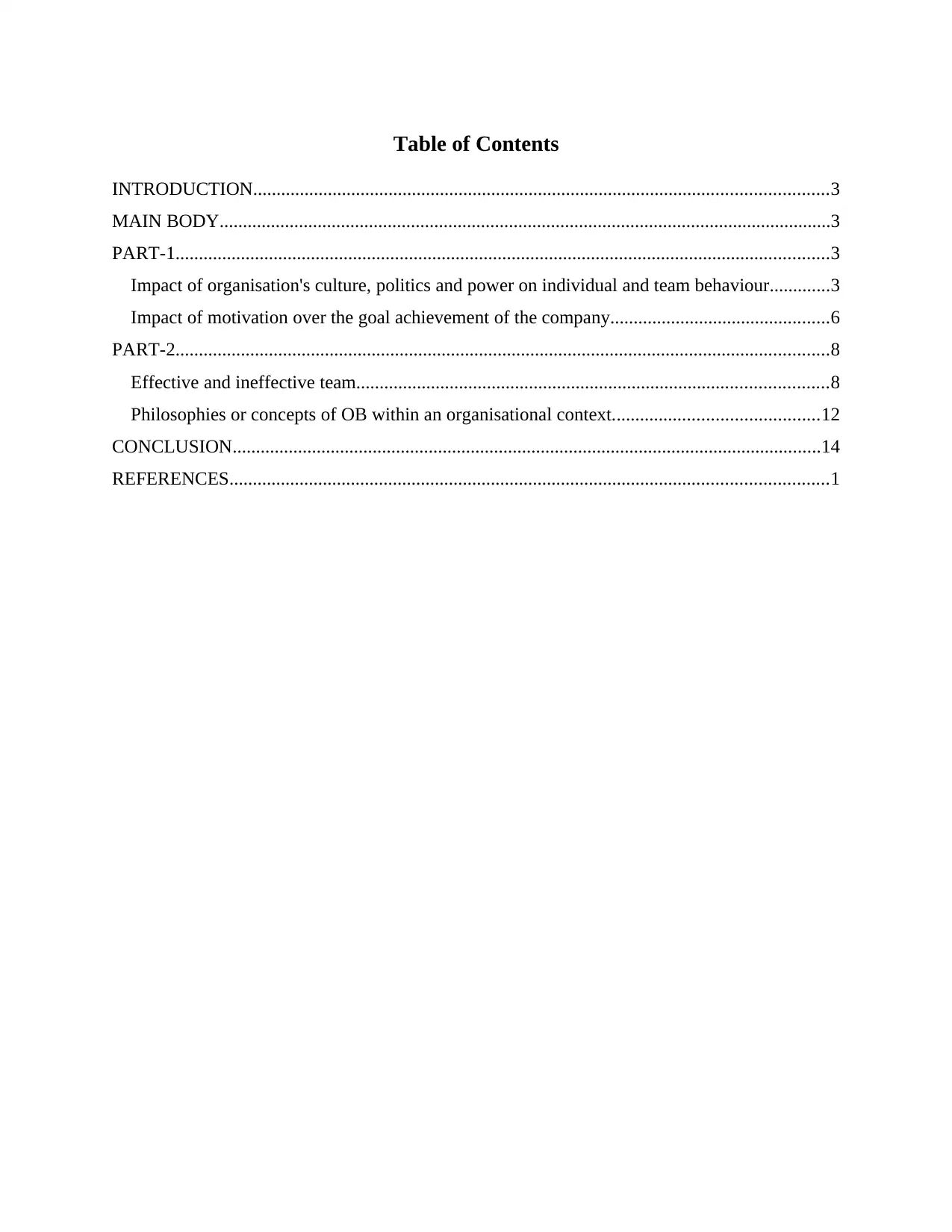
Table of Contents
INTRODUCTION...........................................................................................................................3
MAIN BODY...................................................................................................................................3
PART-1............................................................................................................................................3
Impact of organisation's culture, politics and power on individual and team behaviour.............3
Impact of motivation over the goal achievement of the company...............................................6
PART-2............................................................................................................................................8
Effective and ineffective team.....................................................................................................8
Philosophies or concepts of OB within an organisational context............................................12
CONCLUSION..............................................................................................................................14
REFERENCES................................................................................................................................1
INTRODUCTION...........................................................................................................................3
MAIN BODY...................................................................................................................................3
PART-1............................................................................................................................................3
Impact of organisation's culture, politics and power on individual and team behaviour.............3
Impact of motivation over the goal achievement of the company...............................................6
PART-2............................................................................................................................................8
Effective and ineffective team.....................................................................................................8
Philosophies or concepts of OB within an organisational context............................................12
CONCLUSION..............................................................................................................................14
REFERENCES................................................................................................................................1
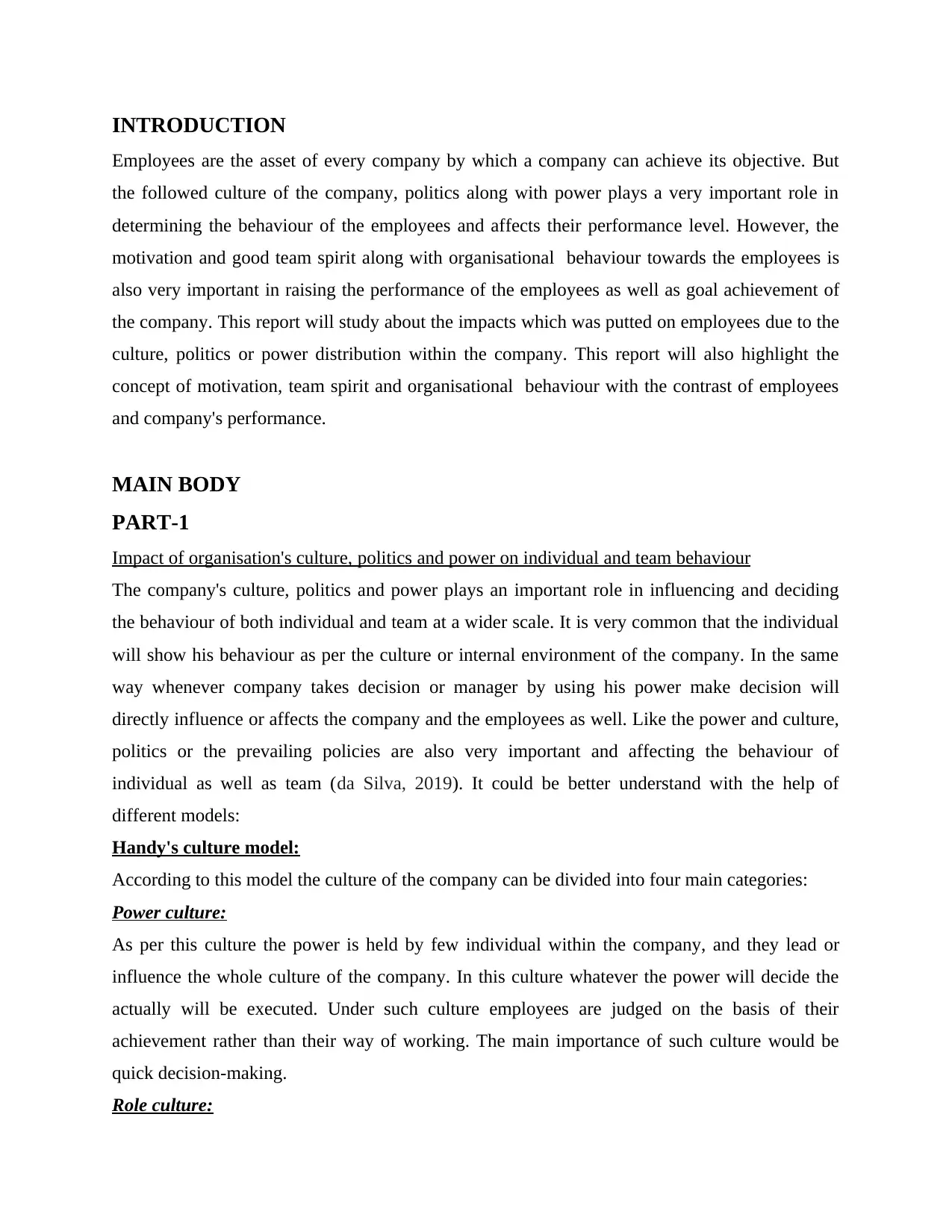
INTRODUCTION
Employees are the asset of every company by which a company can achieve its objective. But
the followed culture of the company, politics along with power plays a very important role in
determining the behaviour of the employees and affects their performance level. However, the
motivation and good team spirit along with organisational behaviour towards the employees is
also very important in raising the performance of the employees as well as goal achievement of
the company. This report will study about the impacts which was putted on employees due to the
culture, politics or power distribution within the company. This report will also highlight the
concept of motivation, team spirit and organisational behaviour with the contrast of employees
and company's performance.
MAIN BODY
PART-1
Impact of organisation's culture, politics and power on individual and team behaviour
The company's culture, politics and power plays an important role in influencing and deciding
the behaviour of both individual and team at a wider scale. It is very common that the individual
will show his behaviour as per the culture or internal environment of the company. In the same
way whenever company takes decision or manager by using his power make decision will
directly influence or affects the company and the employees as well. Like the power and culture,
politics or the prevailing policies are also very important and affecting the behaviour of
individual as well as team (da Silva, 2019). It could be better understand with the help of
different models:
Handy's culture model:
According to this model the culture of the company can be divided into four main categories:
Power culture:
As per this culture the power is held by few individual within the company, and they lead or
influence the whole culture of the company. In this culture whatever the power will decide the
actually will be executed. Under such culture employees are judged on the basis of their
achievement rather than their way of working. The main importance of such culture would be
quick decision-making.
Role culture:
Employees are the asset of every company by which a company can achieve its objective. But
the followed culture of the company, politics along with power plays a very important role in
determining the behaviour of the employees and affects their performance level. However, the
motivation and good team spirit along with organisational behaviour towards the employees is
also very important in raising the performance of the employees as well as goal achievement of
the company. This report will study about the impacts which was putted on employees due to the
culture, politics or power distribution within the company. This report will also highlight the
concept of motivation, team spirit and organisational behaviour with the contrast of employees
and company's performance.
MAIN BODY
PART-1
Impact of organisation's culture, politics and power on individual and team behaviour
The company's culture, politics and power plays an important role in influencing and deciding
the behaviour of both individual and team at a wider scale. It is very common that the individual
will show his behaviour as per the culture or internal environment of the company. In the same
way whenever company takes decision or manager by using his power make decision will
directly influence or affects the company and the employees as well. Like the power and culture,
politics or the prevailing policies are also very important and affecting the behaviour of
individual as well as team (da Silva, 2019). It could be better understand with the help of
different models:
Handy's culture model:
According to this model the culture of the company can be divided into four main categories:
Power culture:
As per this culture the power is held by few individual within the company, and they lead or
influence the whole culture of the company. In this culture whatever the power will decide the
actually will be executed. Under such culture employees are judged on the basis of their
achievement rather than their way of working. The main importance of such culture would be
quick decision-making.
Role culture:
⊘ This is a preview!⊘
Do you want full access?
Subscribe today to unlock all pages.

Trusted by 1+ million students worldwide
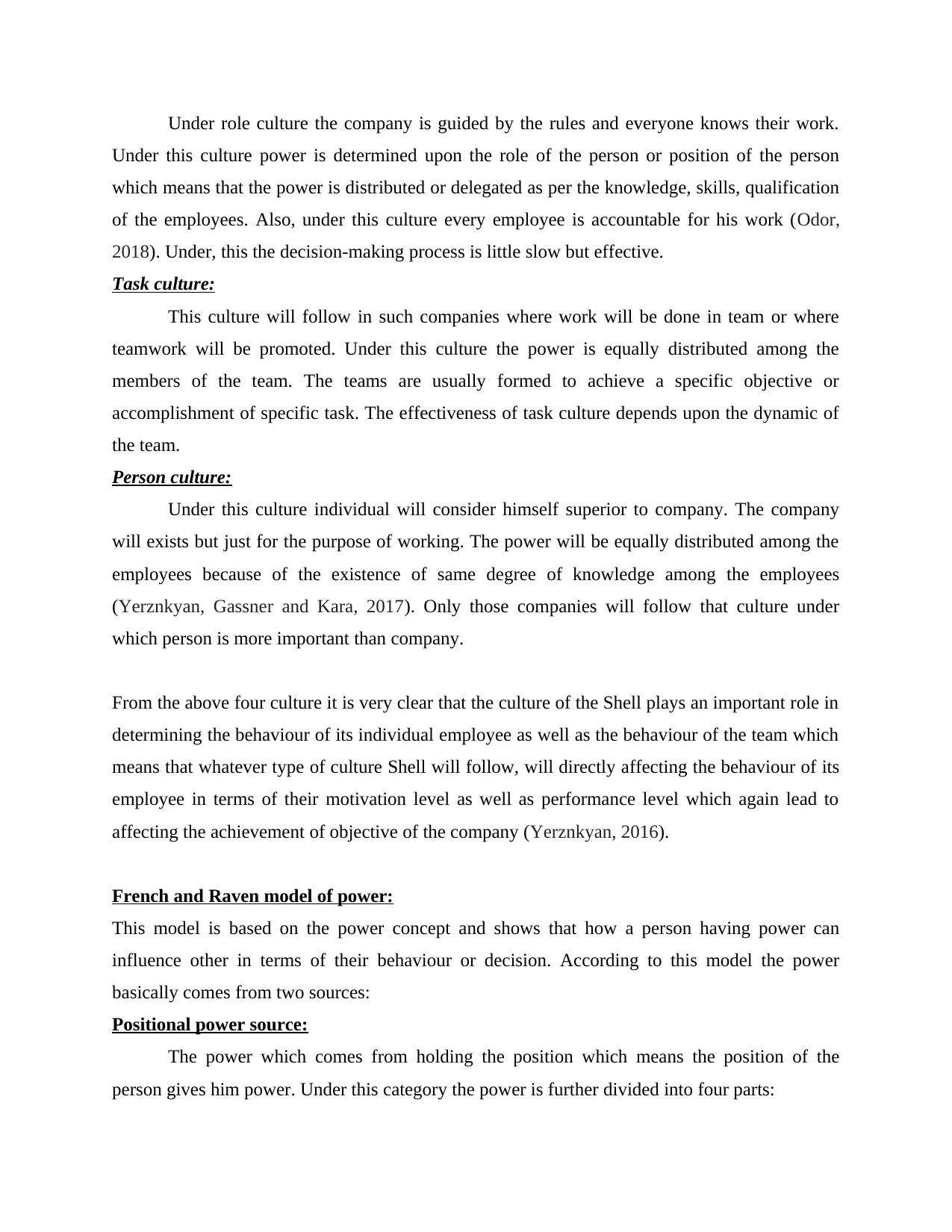
Under role culture the company is guided by the rules and everyone knows their work.
Under this culture power is determined upon the role of the person or position of the person
which means that the power is distributed or delegated as per the knowledge, skills, qualification
of the employees. Also, under this culture every employee is accountable for his work (Odor,
2018). Under, this the decision-making process is little slow but effective.
Task culture:
This culture will follow in such companies where work will be done in team or where
teamwork will be promoted. Under this culture the power is equally distributed among the
members of the team. The teams are usually formed to achieve a specific objective or
accomplishment of specific task. The effectiveness of task culture depends upon the dynamic of
the team.
Person culture:
Under this culture individual will consider himself superior to company. The company
will exists but just for the purpose of working. The power will be equally distributed among the
employees because of the existence of same degree of knowledge among the employees
(Yerznkyan, Gassner and Kara, 2017). Only those companies will follow that culture under
which person is more important than company.
From the above four culture it is very clear that the culture of the Shell plays an important role in
determining the behaviour of its individual employee as well as the behaviour of the team which
means that whatever type of culture Shell will follow, will directly affecting the behaviour of its
employee in terms of their motivation level as well as performance level which again lead to
affecting the achievement of objective of the company (Yerznkyan, 2016).
French and Raven model of power:
This model is based on the power concept and shows that how a person having power can
influence other in terms of their behaviour or decision. According to this model the power
basically comes from two sources:
Positional power source:
The power which comes from holding the position which means the position of the
person gives him power. Under this category the power is further divided into four parts:
Under this culture power is determined upon the role of the person or position of the person
which means that the power is distributed or delegated as per the knowledge, skills, qualification
of the employees. Also, under this culture every employee is accountable for his work (Odor,
2018). Under, this the decision-making process is little slow but effective.
Task culture:
This culture will follow in such companies where work will be done in team or where
teamwork will be promoted. Under this culture the power is equally distributed among the
members of the team. The teams are usually formed to achieve a specific objective or
accomplishment of specific task. The effectiveness of task culture depends upon the dynamic of
the team.
Person culture:
Under this culture individual will consider himself superior to company. The company
will exists but just for the purpose of working. The power will be equally distributed among the
employees because of the existence of same degree of knowledge among the employees
(Yerznkyan, Gassner and Kara, 2017). Only those companies will follow that culture under
which person is more important than company.
From the above four culture it is very clear that the culture of the Shell plays an important role in
determining the behaviour of its individual employee as well as the behaviour of the team which
means that whatever type of culture Shell will follow, will directly affecting the behaviour of its
employee in terms of their motivation level as well as performance level which again lead to
affecting the achievement of objective of the company (Yerznkyan, 2016).
French and Raven model of power:
This model is based on the power concept and shows that how a person having power can
influence other in terms of their behaviour or decision. According to this model the power
basically comes from two sources:
Positional power source:
The power which comes from holding the position which means the position of the
person gives him power. Under this category the power is further divided into four parts:
Paraphrase This Document
Need a fresh take? Get an instant paraphrase of this document with our AI Paraphraser
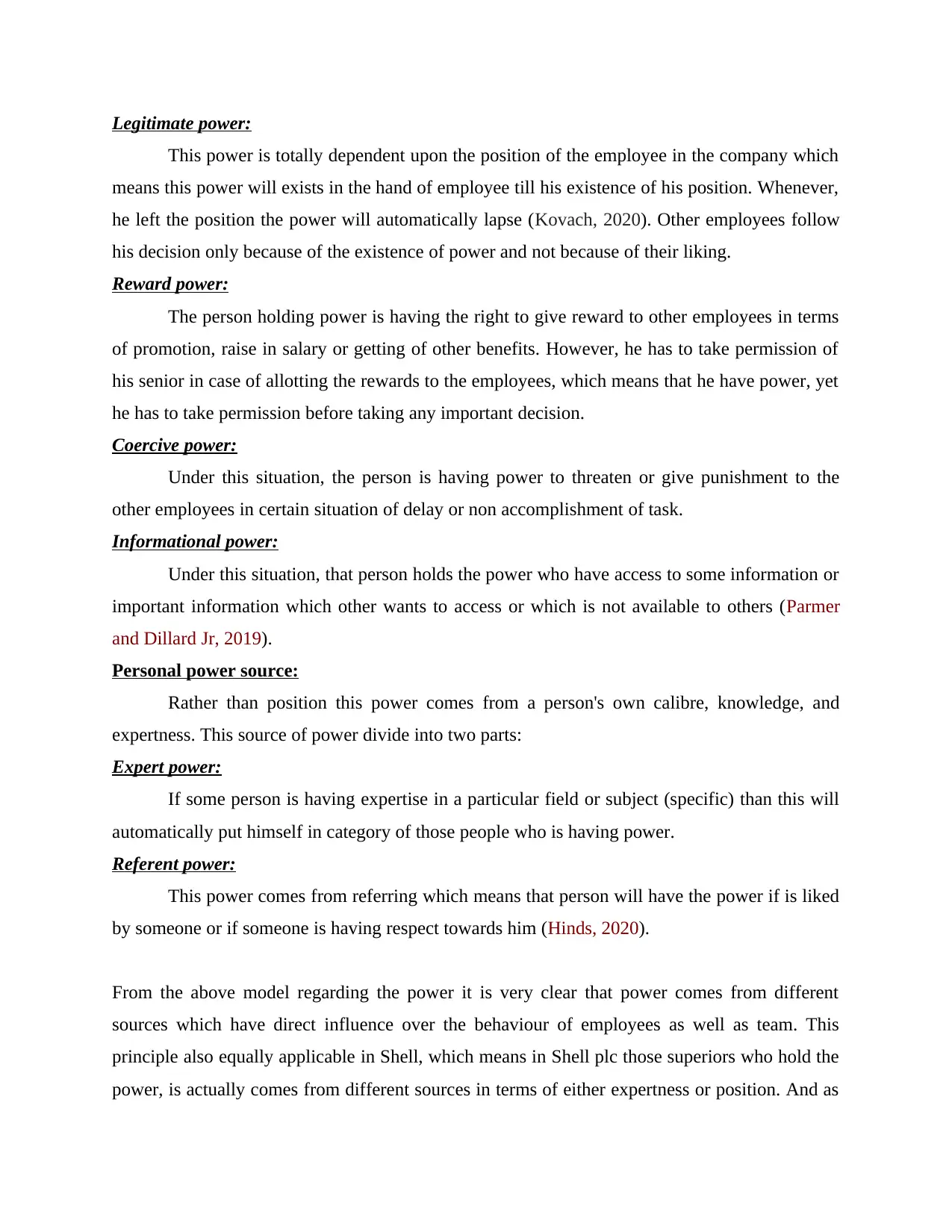
Legitimate power:
This power is totally dependent upon the position of the employee in the company which
means this power will exists in the hand of employee till his existence of his position. Whenever,
he left the position the power will automatically lapse (Kovach, 2020). Other employees follow
his decision only because of the existence of power and not because of their liking.
Reward power:
The person holding power is having the right to give reward to other employees in terms
of promotion, raise in salary or getting of other benefits. However, he has to take permission of
his senior in case of allotting the rewards to the employees, which means that he have power, yet
he has to take permission before taking any important decision.
Coercive power:
Under this situation, the person is having power to threaten or give punishment to the
other employees in certain situation of delay or non accomplishment of task.
Informational power:
Under this situation, that person holds the power who have access to some information or
important information which other wants to access or which is not available to others (Parmer
and Dillard Jr, 2019).
Personal power source:
Rather than position this power comes from a person's own calibre, knowledge, and
expertness. This source of power divide into two parts:
Expert power:
If some person is having expertise in a particular field or subject (specific) than this will
automatically put himself in category of those people who is having power.
Referent power:
This power comes from referring which means that person will have the power if is liked
by someone or if someone is having respect towards him (Hinds, 2020).
From the above model regarding the power it is very clear that power comes from different
sources which have direct influence over the behaviour of employees as well as team. This
principle also equally applicable in Shell, which means in Shell plc those superiors who hold the
power, is actually comes from different sources in terms of either expertness or position. And as
This power is totally dependent upon the position of the employee in the company which
means this power will exists in the hand of employee till his existence of his position. Whenever,
he left the position the power will automatically lapse (Kovach, 2020). Other employees follow
his decision only because of the existence of power and not because of their liking.
Reward power:
The person holding power is having the right to give reward to other employees in terms
of promotion, raise in salary or getting of other benefits. However, he has to take permission of
his senior in case of allotting the rewards to the employees, which means that he have power, yet
he has to take permission before taking any important decision.
Coercive power:
Under this situation, the person is having power to threaten or give punishment to the
other employees in certain situation of delay or non accomplishment of task.
Informational power:
Under this situation, that person holds the power who have access to some information or
important information which other wants to access or which is not available to others (Parmer
and Dillard Jr, 2019).
Personal power source:
Rather than position this power comes from a person's own calibre, knowledge, and
expertness. This source of power divide into two parts:
Expert power:
If some person is having expertise in a particular field or subject (specific) than this will
automatically put himself in category of those people who is having power.
Referent power:
This power comes from referring which means that person will have the power if is liked
by someone or if someone is having respect towards him (Hinds, 2020).
From the above model regarding the power it is very clear that power comes from different
sources which have direct influence over the behaviour of employees as well as team. This
principle also equally applicable in Shell, which means in Shell plc those superiors who hold the
power, is actually comes from different sources in terms of either expertness or position. And as
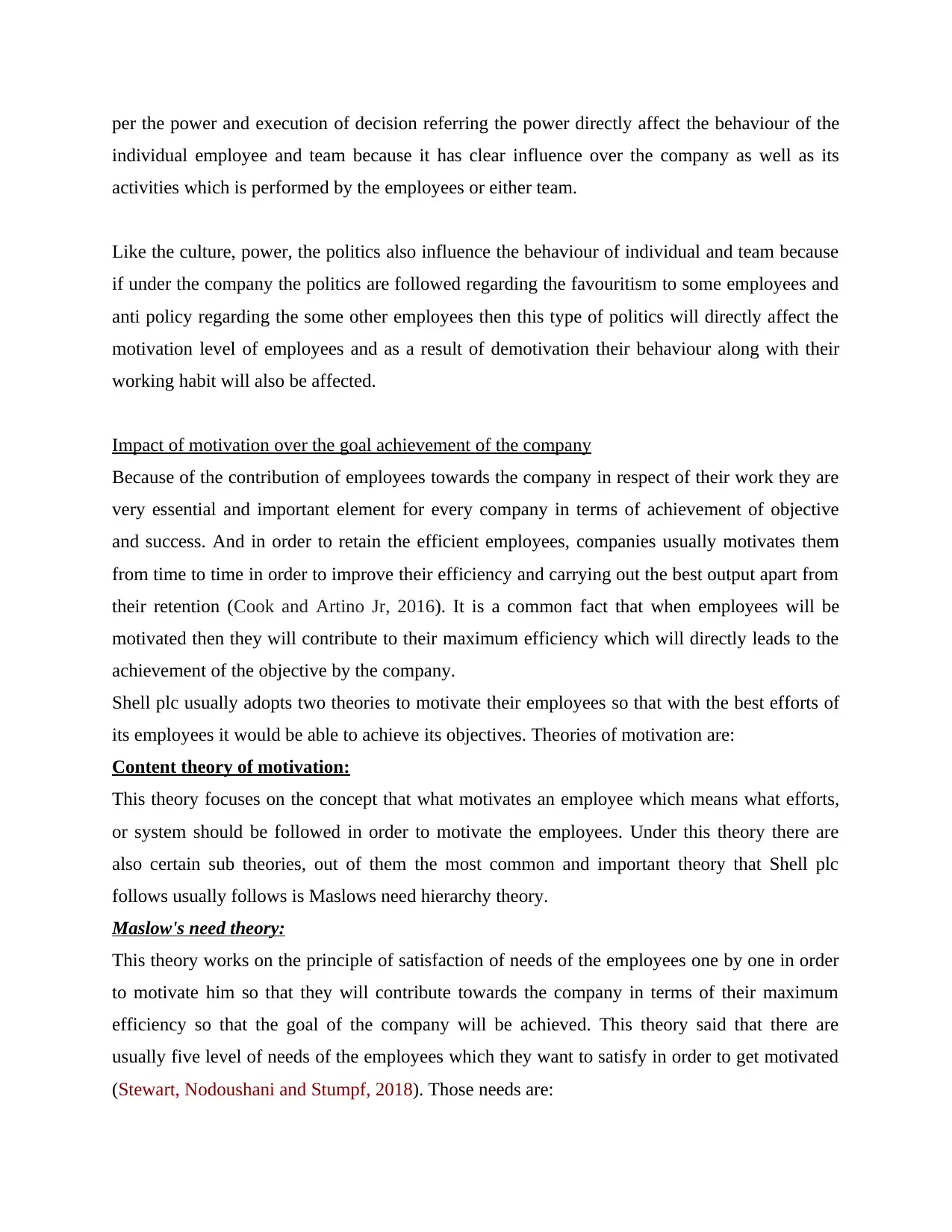
per the power and execution of decision referring the power directly affect the behaviour of the
individual employee and team because it has clear influence over the company as well as its
activities which is performed by the employees or either team.
Like the culture, power, the politics also influence the behaviour of individual and team because
if under the company the politics are followed regarding the favouritism to some employees and
anti policy regarding the some other employees then this type of politics will directly affect the
motivation level of employees and as a result of demotivation their behaviour along with their
working habit will also be affected.
Impact of motivation over the goal achievement of the company
Because of the contribution of employees towards the company in respect of their work they are
very essential and important element for every company in terms of achievement of objective
and success. And in order to retain the efficient employees, companies usually motivates them
from time to time in order to improve their efficiency and carrying out the best output apart from
their retention (Cook and Artino Jr, 2016). It is a common fact that when employees will be
motivated then they will contribute to their maximum efficiency which will directly leads to the
achievement of the objective by the company.
Shell plc usually adopts two theories to motivate their employees so that with the best efforts of
its employees it would be able to achieve its objectives. Theories of motivation are:
Content theory of motivation:
This theory focuses on the concept that what motivates an employee which means what efforts,
or system should be followed in order to motivate the employees. Under this theory there are
also certain sub theories, out of them the most common and important theory that Shell plc
follows usually follows is Maslows need hierarchy theory.
Maslow's need theory:
This theory works on the principle of satisfaction of needs of the employees one by one in order
to motivate him so that they will contribute towards the company in terms of their maximum
efficiency so that the goal of the company will be achieved. This theory said that there are
usually five level of needs of the employees which they want to satisfy in order to get motivated
(Stewart, Nodoushani and Stumpf, 2018). Those needs are:
individual employee and team because it has clear influence over the company as well as its
activities which is performed by the employees or either team.
Like the culture, power, the politics also influence the behaviour of individual and team because
if under the company the politics are followed regarding the favouritism to some employees and
anti policy regarding the some other employees then this type of politics will directly affect the
motivation level of employees and as a result of demotivation their behaviour along with their
working habit will also be affected.
Impact of motivation over the goal achievement of the company
Because of the contribution of employees towards the company in respect of their work they are
very essential and important element for every company in terms of achievement of objective
and success. And in order to retain the efficient employees, companies usually motivates them
from time to time in order to improve their efficiency and carrying out the best output apart from
their retention (Cook and Artino Jr, 2016). It is a common fact that when employees will be
motivated then they will contribute to their maximum efficiency which will directly leads to the
achievement of the objective by the company.
Shell plc usually adopts two theories to motivate their employees so that with the best efforts of
its employees it would be able to achieve its objectives. Theories of motivation are:
Content theory of motivation:
This theory focuses on the concept that what motivates an employee which means what efforts,
or system should be followed in order to motivate the employees. Under this theory there are
also certain sub theories, out of them the most common and important theory that Shell plc
follows usually follows is Maslows need hierarchy theory.
Maslow's need theory:
This theory works on the principle of satisfaction of needs of the employees one by one in order
to motivate him so that they will contribute towards the company in terms of their maximum
efficiency so that the goal of the company will be achieved. This theory said that there are
usually five level of needs of the employees which they want to satisfy in order to get motivated
(Stewart, Nodoushani and Stumpf, 2018). Those needs are:
⊘ This is a preview!⊘
Do you want full access?
Subscribe today to unlock all pages.

Trusted by 1+ million students worldwide
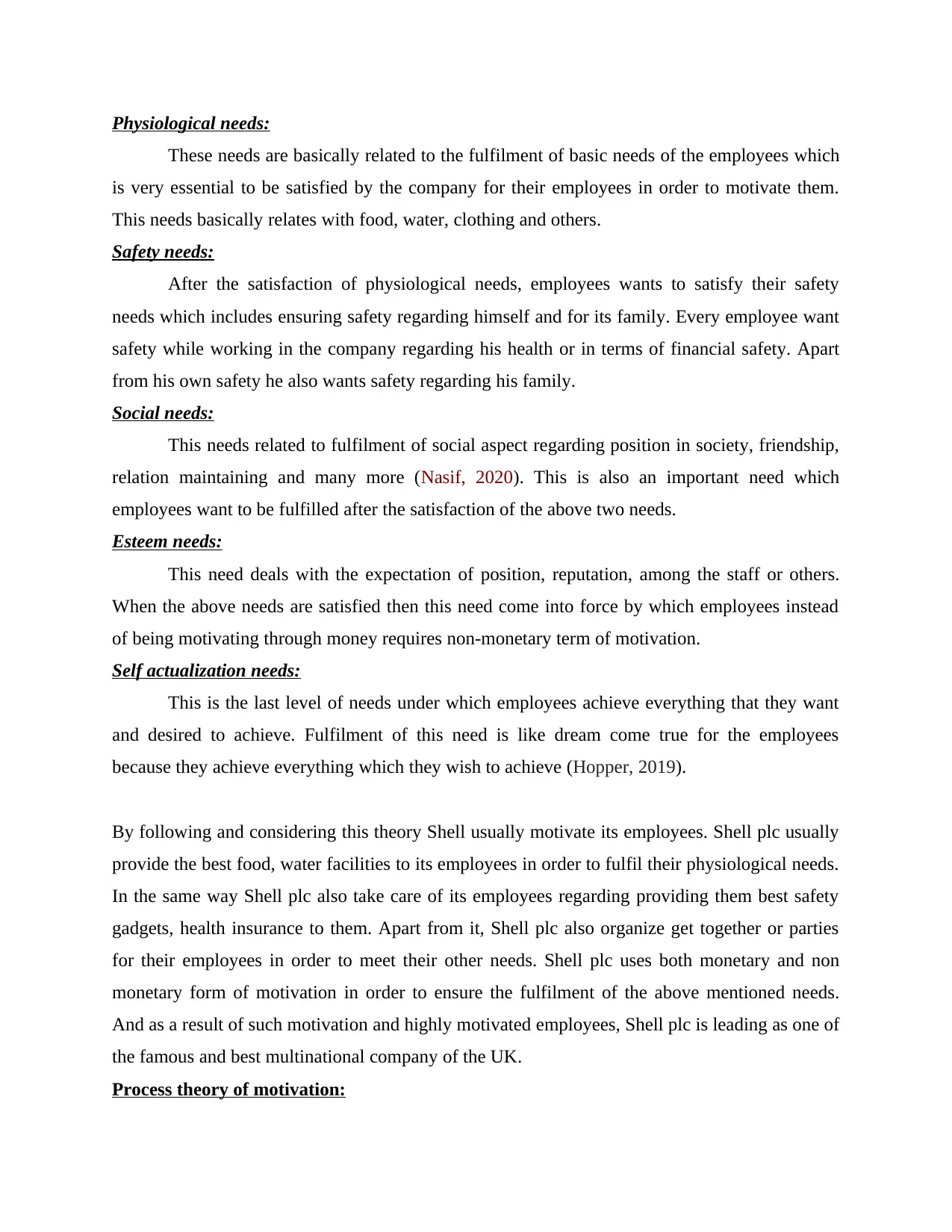
Physiological needs:
These needs are basically related to the fulfilment of basic needs of the employees which
is very essential to be satisfied by the company for their employees in order to motivate them.
This needs basically relates with food, water, clothing and others.
Safety needs:
After the satisfaction of physiological needs, employees wants to satisfy their safety
needs which includes ensuring safety regarding himself and for its family. Every employee want
safety while working in the company regarding his health or in terms of financial safety. Apart
from his own safety he also wants safety regarding his family.
Social needs:
This needs related to fulfilment of social aspect regarding position in society, friendship,
relation maintaining and many more (Nasif, 2020). This is also an important need which
employees want to be fulfilled after the satisfaction of the above two needs.
Esteem needs:
This need deals with the expectation of position, reputation, among the staff or others.
When the above needs are satisfied then this need come into force by which employees instead
of being motivating through money requires non-monetary term of motivation.
Self actualization needs:
This is the last level of needs under which employees achieve everything that they want
and desired to achieve. Fulfilment of this need is like dream come true for the employees
because they achieve everything which they wish to achieve (Hopper, 2019).
By following and considering this theory Shell usually motivate its employees. Shell plc usually
provide the best food, water facilities to its employees in order to fulfil their physiological needs.
In the same way Shell plc also take care of its employees regarding providing them best safety
gadgets, health insurance to them. Apart from it, Shell plc also organize get together or parties
for their employees in order to meet their other needs. Shell plc uses both monetary and non
monetary form of motivation in order to ensure the fulfilment of the above mentioned needs.
And as a result of such motivation and highly motivated employees, Shell plc is leading as one of
the famous and best multinational company of the UK.
Process theory of motivation:
These needs are basically related to the fulfilment of basic needs of the employees which
is very essential to be satisfied by the company for their employees in order to motivate them.
This needs basically relates with food, water, clothing and others.
Safety needs:
After the satisfaction of physiological needs, employees wants to satisfy their safety
needs which includes ensuring safety regarding himself and for its family. Every employee want
safety while working in the company regarding his health or in terms of financial safety. Apart
from his own safety he also wants safety regarding his family.
Social needs:
This needs related to fulfilment of social aspect regarding position in society, friendship,
relation maintaining and many more (Nasif, 2020). This is also an important need which
employees want to be fulfilled after the satisfaction of the above two needs.
Esteem needs:
This need deals with the expectation of position, reputation, among the staff or others.
When the above needs are satisfied then this need come into force by which employees instead
of being motivating through money requires non-monetary term of motivation.
Self actualization needs:
This is the last level of needs under which employees achieve everything that they want
and desired to achieve. Fulfilment of this need is like dream come true for the employees
because they achieve everything which they wish to achieve (Hopper, 2019).
By following and considering this theory Shell usually motivate its employees. Shell plc usually
provide the best food, water facilities to its employees in order to fulfil their physiological needs.
In the same way Shell plc also take care of its employees regarding providing them best safety
gadgets, health insurance to them. Apart from it, Shell plc also organize get together or parties
for their employees in order to meet their other needs. Shell plc uses both monetary and non
monetary form of motivation in order to ensure the fulfilment of the above mentioned needs.
And as a result of such motivation and highly motivated employees, Shell plc is leading as one of
the famous and best multinational company of the UK.
Process theory of motivation:
Paraphrase This Document
Need a fresh take? Get an instant paraphrase of this document with our AI Paraphraser
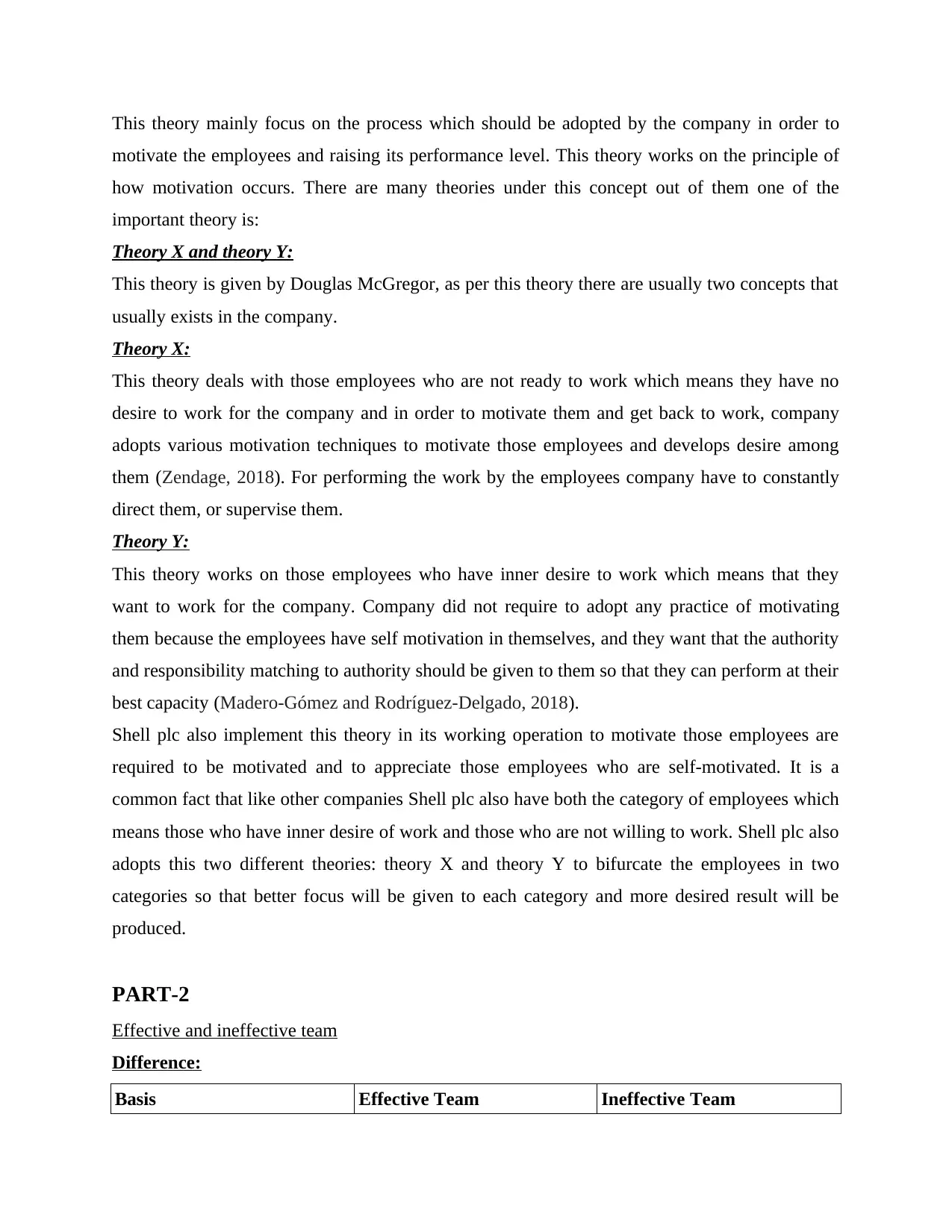
This theory mainly focus on the process which should be adopted by the company in order to
motivate the employees and raising its performance level. This theory works on the principle of
how motivation occurs. There are many theories under this concept out of them one of the
important theory is:
Theory X and theory Y:
This theory is given by Douglas McGregor, as per this theory there are usually two concepts that
usually exists in the company.
Theory X:
This theory deals with those employees who are not ready to work which means they have no
desire to work for the company and in order to motivate them and get back to work, company
adopts various motivation techniques to motivate those employees and develops desire among
them (Zendage, 2018). For performing the work by the employees company have to constantly
direct them, or supervise them.
Theory Y:
This theory works on those employees who have inner desire to work which means that they
want to work for the company. Company did not require to adopt any practice of motivating
them because the employees have self motivation in themselves, and they want that the authority
and responsibility matching to authority should be given to them so that they can perform at their
best capacity (Madero-Gómez and Rodríguez-Delgado, 2018).
Shell plc also implement this theory in its working operation to motivate those employees are
required to be motivated and to appreciate those employees who are self-motivated. It is a
common fact that like other companies Shell plc also have both the category of employees which
means those who have inner desire of work and those who are not willing to work. Shell plc also
adopts this two different theories: theory X and theory Y to bifurcate the employees in two
categories so that better focus will be given to each category and more desired result will be
produced.
PART-2
Effective and ineffective team
Difference:
Basis Effective Team Ineffective Team
motivate the employees and raising its performance level. This theory works on the principle of
how motivation occurs. There are many theories under this concept out of them one of the
important theory is:
Theory X and theory Y:
This theory is given by Douglas McGregor, as per this theory there are usually two concepts that
usually exists in the company.
Theory X:
This theory deals with those employees who are not ready to work which means they have no
desire to work for the company and in order to motivate them and get back to work, company
adopts various motivation techniques to motivate those employees and develops desire among
them (Zendage, 2018). For performing the work by the employees company have to constantly
direct them, or supervise them.
Theory Y:
This theory works on those employees who have inner desire to work which means that they
want to work for the company. Company did not require to adopt any practice of motivating
them because the employees have self motivation in themselves, and they want that the authority
and responsibility matching to authority should be given to them so that they can perform at their
best capacity (Madero-Gómez and Rodríguez-Delgado, 2018).
Shell plc also implement this theory in its working operation to motivate those employees are
required to be motivated and to appreciate those employees who are self-motivated. It is a
common fact that like other companies Shell plc also have both the category of employees which
means those who have inner desire of work and those who are not willing to work. Shell plc also
adopts this two different theories: theory X and theory Y to bifurcate the employees in two
categories so that better focus will be given to each category and more desired result will be
produced.
PART-2
Effective and ineffective team
Difference:
Basis Effective Team Ineffective Team
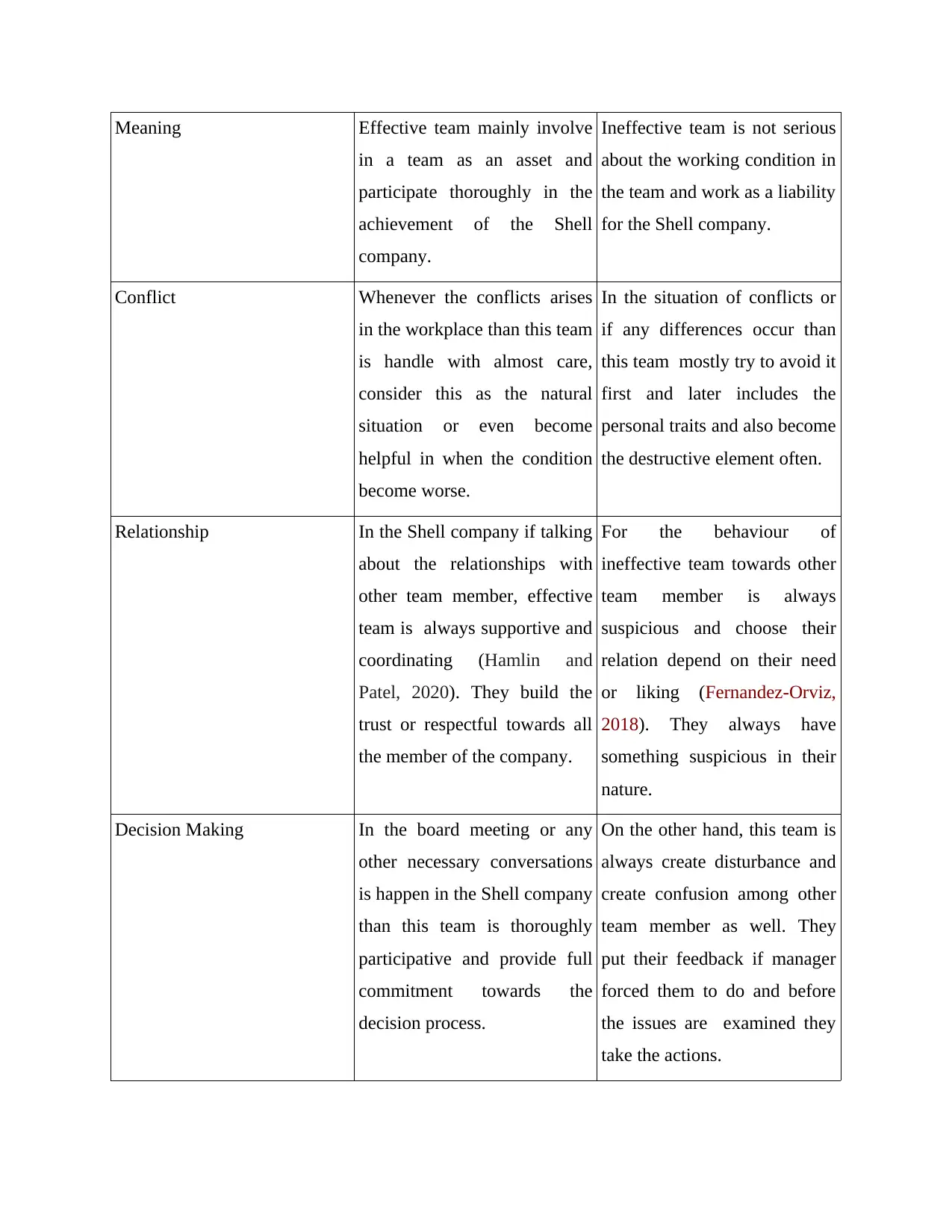
Meaning Effective team mainly involve
in a team as an asset and
participate thoroughly in the
achievement of the Shell
company.
Ineffective team is not serious
about the working condition in
the team and work as a liability
for the Shell company.
Conflict Whenever the conflicts arises
in the workplace than this team
is handle with almost care,
consider this as the natural
situation or even become
helpful in when the condition
become worse.
In the situation of conflicts or
if any differences occur than
this team mostly try to avoid it
first and later includes the
personal traits and also become
the destructive element often.
Relationship In the Shell company if talking
about the relationships with
other team member, effective
team is always supportive and
coordinating (Hamlin and
Patel, 2020). They build the
trust or respectful towards all
the member of the company.
For the behaviour of
ineffective team towards other
team member is always
suspicious and choose their
relation depend on their need
or liking (Fernandez-Orviz,
2018). They always have
something suspicious in their
nature.
Decision Making In the board meeting or any
other necessary conversations
is happen in the Shell company
than this team is thoroughly
participative and provide full
commitment towards the
decision process.
On the other hand, this team is
always create disturbance and
create confusion among other
team member as well. They
put their feedback if manager
forced them to do and before
the issues are examined they
take the actions.
in a team as an asset and
participate thoroughly in the
achievement of the Shell
company.
Ineffective team is not serious
about the working condition in
the team and work as a liability
for the Shell company.
Conflict Whenever the conflicts arises
in the workplace than this team
is handle with almost care,
consider this as the natural
situation or even become
helpful in when the condition
become worse.
In the situation of conflicts or
if any differences occur than
this team mostly try to avoid it
first and later includes the
personal traits and also become
the destructive element often.
Relationship In the Shell company if talking
about the relationships with
other team member, effective
team is always supportive and
coordinating (Hamlin and
Patel, 2020). They build the
trust or respectful towards all
the member of the company.
For the behaviour of
ineffective team towards other
team member is always
suspicious and choose their
relation depend on their need
or liking (Fernandez-Orviz,
2018). They always have
something suspicious in their
nature.
Decision Making In the board meeting or any
other necessary conversations
is happen in the Shell company
than this team is thoroughly
participative and provide full
commitment towards the
decision process.
On the other hand, this team is
always create disturbance and
create confusion among other
team member as well. They
put their feedback if manager
forced them to do and before
the issues are examined they
take the actions.
⊘ This is a preview!⊘
Do you want full access?
Subscribe today to unlock all pages.

Trusted by 1+ million students worldwide
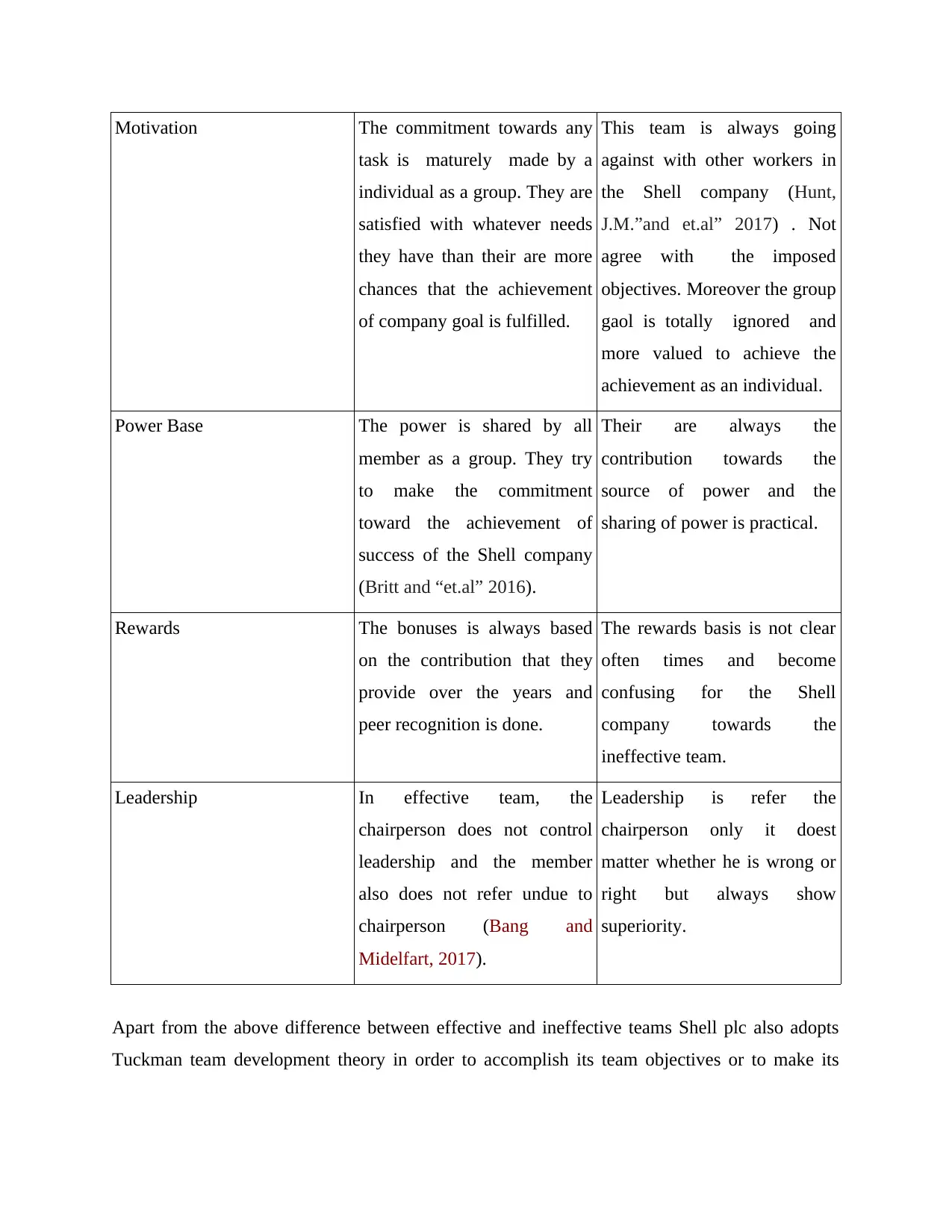
Motivation The commitment towards any
task is maturely made by a
individual as a group. They are
satisfied with whatever needs
they have than their are more
chances that the achievement
of company goal is fulfilled.
This team is always going
against with other workers in
the Shell company (Hunt,
J.M.”and et.al” 2017) . Not
agree with the imposed
objectives. Moreover the group
gaol is totally ignored and
more valued to achieve the
achievement as an individual.
Power Base The power is shared by all
member as a group. They try
to make the commitment
toward the achievement of
success of the Shell company
(Britt and “et.al” 2016).
Their are always the
contribution towards the
source of power and the
sharing of power is practical.
Rewards The bonuses is always based
on the contribution that they
provide over the years and
peer recognition is done.
The rewards basis is not clear
often times and become
confusing for the Shell
company towards the
ineffective team.
Leadership In effective team, the
chairperson does not control
leadership and the member
also does not refer undue to
chairperson (Bang and
Midelfart, 2017).
Leadership is refer the
chairperson only it doest
matter whether he is wrong or
right but always show
superiority.
Apart from the above difference between effective and ineffective teams Shell plc also adopts
Tuckman team development theory in order to accomplish its team objectives or to make its
task is maturely made by a
individual as a group. They are
satisfied with whatever needs
they have than their are more
chances that the achievement
of company goal is fulfilled.
This team is always going
against with other workers in
the Shell company (Hunt,
J.M.”and et.al” 2017) . Not
agree with the imposed
objectives. Moreover the group
gaol is totally ignored and
more valued to achieve the
achievement as an individual.
Power Base The power is shared by all
member as a group. They try
to make the commitment
toward the achievement of
success of the Shell company
(Britt and “et.al” 2016).
Their are always the
contribution towards the
source of power and the
sharing of power is practical.
Rewards The bonuses is always based
on the contribution that they
provide over the years and
peer recognition is done.
The rewards basis is not clear
often times and become
confusing for the Shell
company towards the
ineffective team.
Leadership In effective team, the
chairperson does not control
leadership and the member
also does not refer undue to
chairperson (Bang and
Midelfart, 2017).
Leadership is refer the
chairperson only it doest
matter whether he is wrong or
right but always show
superiority.
Apart from the above difference between effective and ineffective teams Shell plc also adopts
Tuckman team development theory in order to accomplish its team objectives or to make its
Paraphrase This Document
Need a fresh take? Get an instant paraphrase of this document with our AI Paraphraser
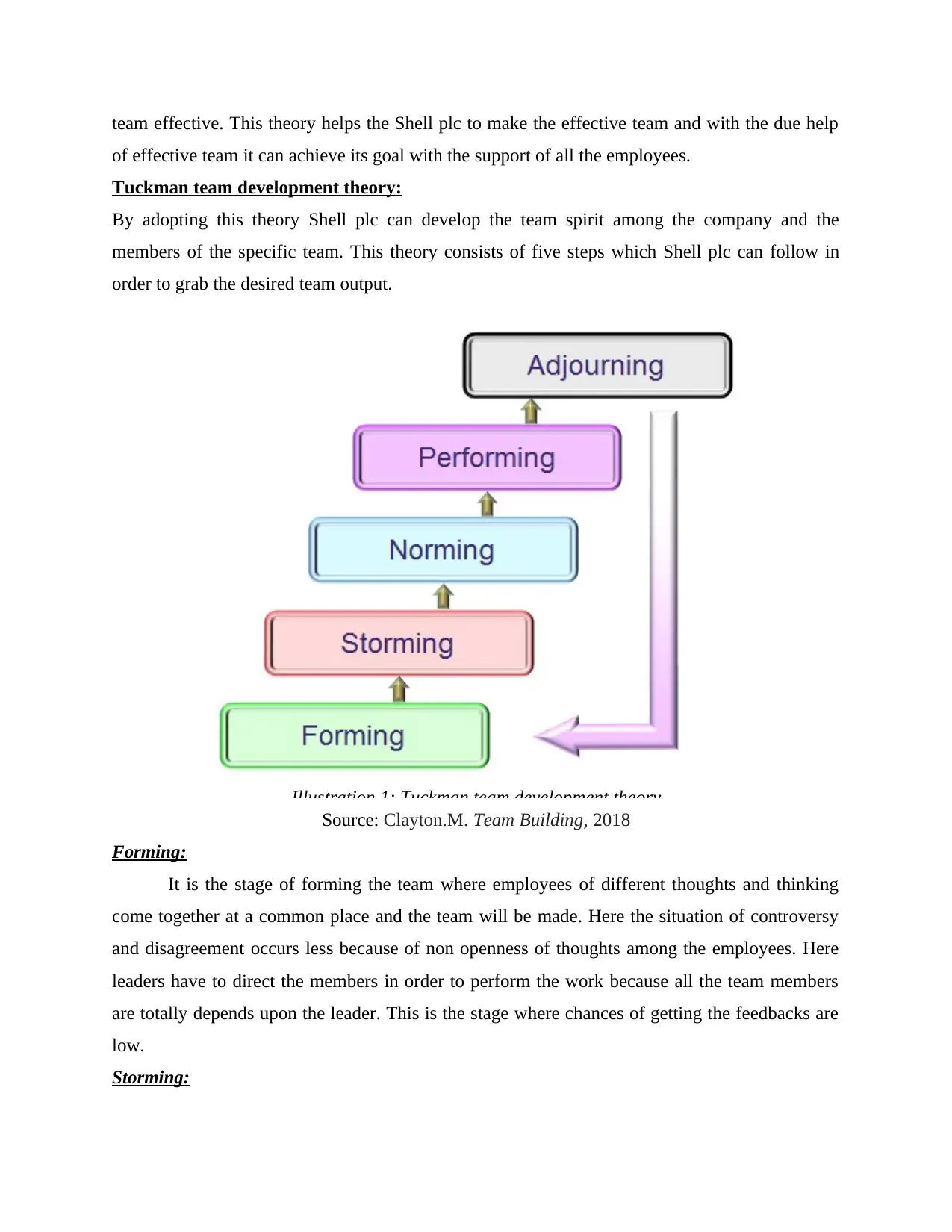
team effective. This theory helps the Shell plc to make the effective team and with the due help
of effective team it can achieve its goal with the support of all the employees.
Tuckman team development theory:
By adopting this theory Shell plc can develop the team spirit among the company and the
members of the specific team. This theory consists of five steps which Shell plc can follow in
order to grab the desired team output.
Source: Clayton.M. Team Building, 2018
Forming:
It is the stage of forming the team where employees of different thoughts and thinking
come together at a common place and the team will be made. Here the situation of controversy
and disagreement occurs less because of non openness of thoughts among the employees. Here
leaders have to direct the members in order to perform the work because all the team members
are totally depends upon the leader. This is the stage where chances of getting the feedbacks are
low.
Storming:
Illustration 1: Tuckman team development theory
of effective team it can achieve its goal with the support of all the employees.
Tuckman team development theory:
By adopting this theory Shell plc can develop the team spirit among the company and the
members of the specific team. This theory consists of five steps which Shell plc can follow in
order to grab the desired team output.
Source: Clayton.M. Team Building, 2018
Forming:
It is the stage of forming the team where employees of different thoughts and thinking
come together at a common place and the team will be made. Here the situation of controversy
and disagreement occurs less because of non openness of thoughts among the employees. Here
leaders have to direct the members in order to perform the work because all the team members
are totally depends upon the leader. This is the stage where chances of getting the feedbacks are
low.
Storming:
Illustration 1: Tuckman team development theory
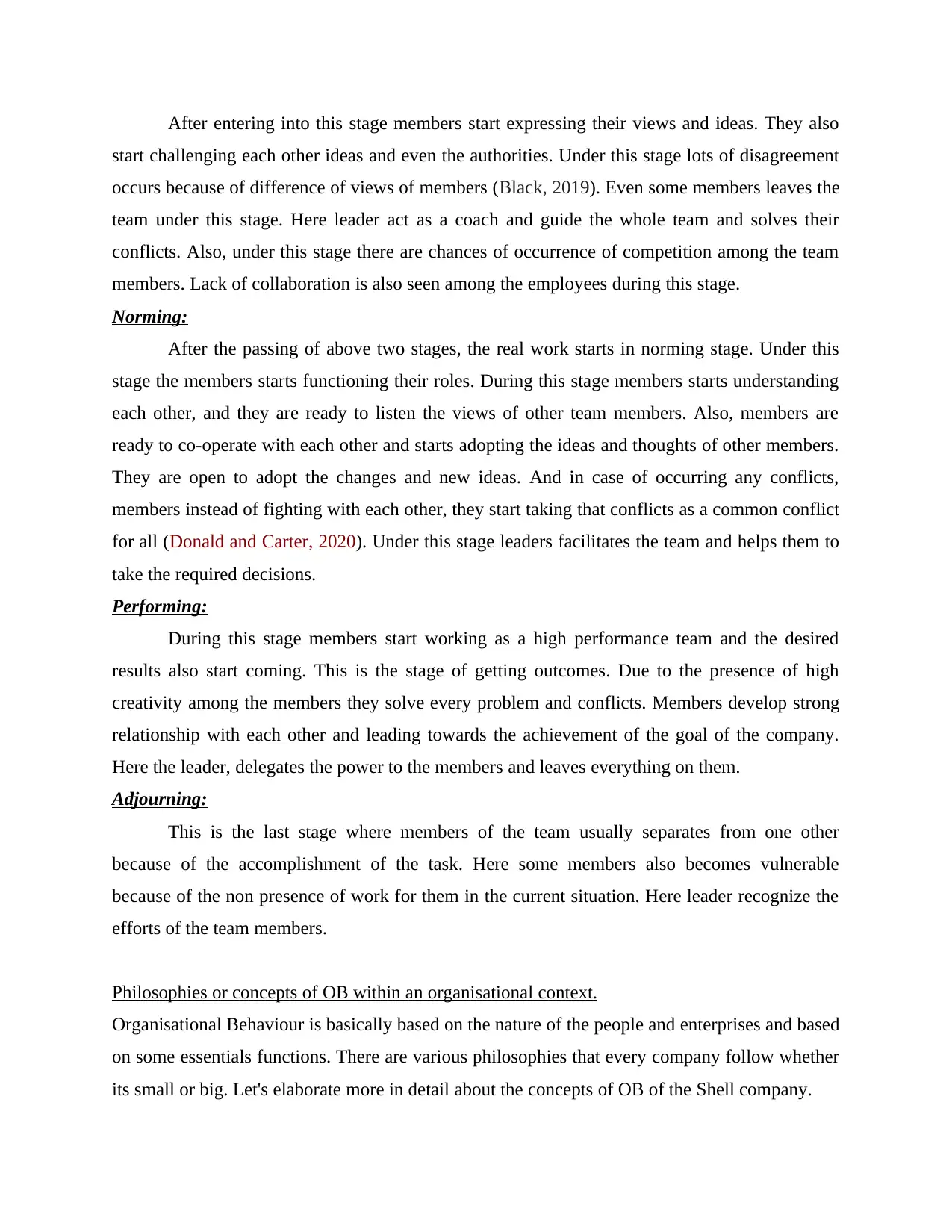
After entering into this stage members start expressing their views and ideas. They also
start challenging each other ideas and even the authorities. Under this stage lots of disagreement
occurs because of difference of views of members (Black, 2019). Even some members leaves the
team under this stage. Here leader act as a coach and guide the whole team and solves their
conflicts. Also, under this stage there are chances of occurrence of competition among the team
members. Lack of collaboration is also seen among the employees during this stage.
Norming:
After the passing of above two stages, the real work starts in norming stage. Under this
stage the members starts functioning their roles. During this stage members starts understanding
each other, and they are ready to listen the views of other team members. Also, members are
ready to co-operate with each other and starts adopting the ideas and thoughts of other members.
They are open to adopt the changes and new ideas. And in case of occurring any conflicts,
members instead of fighting with each other, they start taking that conflicts as a common conflict
for all (Donald and Carter, 2020). Under this stage leaders facilitates the team and helps them to
take the required decisions.
Performing:
During this stage members start working as a high performance team and the desired
results also start coming. This is the stage of getting outcomes. Due to the presence of high
creativity among the members they solve every problem and conflicts. Members develop strong
relationship with each other and leading towards the achievement of the goal of the company.
Here the leader, delegates the power to the members and leaves everything on them.
Adjourning:
This is the last stage where members of the team usually separates from one other
because of the accomplishment of the task. Here some members also becomes vulnerable
because of the non presence of work for them in the current situation. Here leader recognize the
efforts of the team members.
Philosophies or concepts of OB within an organisational context.
Organisational Behaviour is basically based on the nature of the people and enterprises and based
on some essentials functions. There are various philosophies that every company follow whether
its small or big. Let's elaborate more in detail about the concepts of OB of the Shell company.
start challenging each other ideas and even the authorities. Under this stage lots of disagreement
occurs because of difference of views of members (Black, 2019). Even some members leaves the
team under this stage. Here leader act as a coach and guide the whole team and solves their
conflicts. Also, under this stage there are chances of occurrence of competition among the team
members. Lack of collaboration is also seen among the employees during this stage.
Norming:
After the passing of above two stages, the real work starts in norming stage. Under this
stage the members starts functioning their roles. During this stage members starts understanding
each other, and they are ready to listen the views of other team members. Also, members are
ready to co-operate with each other and starts adopting the ideas and thoughts of other members.
They are open to adopt the changes and new ideas. And in case of occurring any conflicts,
members instead of fighting with each other, they start taking that conflicts as a common conflict
for all (Donald and Carter, 2020). Under this stage leaders facilitates the team and helps them to
take the required decisions.
Performing:
During this stage members start working as a high performance team and the desired
results also start coming. This is the stage of getting outcomes. Due to the presence of high
creativity among the members they solve every problem and conflicts. Members develop strong
relationship with each other and leading towards the achievement of the goal of the company.
Here the leader, delegates the power to the members and leaves everything on them.
Adjourning:
This is the last stage where members of the team usually separates from one other
because of the accomplishment of the task. Here some members also becomes vulnerable
because of the non presence of work for them in the current situation. Here leader recognize the
efforts of the team members.
Philosophies or concepts of OB within an organisational context.
Organisational Behaviour is basically based on the nature of the people and enterprises and based
on some essentials functions. There are various philosophies that every company follow whether
its small or big. Let's elaborate more in detail about the concepts of OB of the Shell company.
⊘ This is a preview!⊘
Do you want full access?
Subscribe today to unlock all pages.

Trusted by 1+ million students worldwide
1 out of 17
Related Documents
Your All-in-One AI-Powered Toolkit for Academic Success.
+13062052269
info@desklib.com
Available 24*7 on WhatsApp / Email
![[object Object]](/_next/static/media/star-bottom.7253800d.svg)
Unlock your academic potential
Copyright © 2020–2026 A2Z Services. All Rights Reserved. Developed and managed by ZUCOL.





